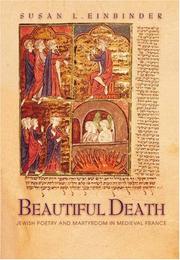| Listing 1 - 1 of 1 |
Sort by
|

ISBN: 1282157787 9786612157783 1400825253 9781400825257 9780691090535 069109053X 069109053X Year: 2002 Publisher: Princeton, N.J. Princeton University Press
Abstract | Keywords | Export | Availability | Bookmark
 Loading...
Loading...Choose an application
- Reference Manager
- EndNote
- RefWorks (Direct export to RefWorks)
When Crusader armies on their way to the Holy Land attacked Jewish communities in the Rhine Valley, many Jews chose suicide over death at the hands of Christian mobs. With their defiant deaths, the medieval Jewish martyr was born. With the literary commemoration of the victims, Jewish martyrology followed. Beautiful Death examines the evolution of a long-neglected corpus of Hebrew poetry, the laments reflecting the specific conditions of Jewish life in northern France. The poems offer insight into everyday life and into the ways medieval French Jews responded to persecution. They also suggest that poetry was used to encourage resistance to intensifying pressures to convert. The educated Jewish elite in northern France was highly acculturated. Their poetry--particularly that emerging from the innovative Tosafist schools--reflects their engagement with the vernacular renaissance unfolding around them, as well as conscious and unconscious absorption of Christian popular beliefs and hagiographical conventions. At the same time, their extraordinary poems signal an increasingly harsh repudiation of Christianity's sacred symbols and beliefs. They reveal a complex relationship to Christian culture as Jews internalized elements of medieval culture even while expressing a powerful revulsion against the forms and beliefs of Christian life. This gracefully written study crosses traditional boundaries of history and literature and of Jewish and general medieval scholarship. Focusing on specific incidents of persecution and the literary commemorations they produced, it offers unique insights into the historical conditions in which these poems were written and performed.
Jews --- Judaism --- Martyrdom --- Martyrdom in literature. --- Hebrew literature, Medieval --- Hebrews --- Israelites --- Jewish people --- Jewry --- Judaic people --- Judaists --- Ethnology --- Religious adherents --- Semites --- Religions --- Martyrdom (Judaism) --- Persecutions --- History --- Judaism. --- History and criticism. --- Religion --- Abraham ibn Ezra. --- Allusion. --- Apostasy. --- Ashkenaz. --- Blood libel. --- Book burning. --- Book of Ezekiel. --- Books of Kings. --- Christian literature. --- Christianity. --- Conversion to Christianity. --- Conversion to Judaism. --- Crusades. --- Defection. --- Desecration. --- Desperation (novel). --- Elohim. --- Emeritus. --- Exegesis. --- Ezekiel. --- First Crusade. --- Gershom. --- God. --- Hagigah. --- Hagiography. --- Halevi. --- Harassment. --- Hazzan. --- Hebrew Bible. --- Hebrew language. --- Heresy. --- High Middle Ages. --- Historian. --- Host desecration. --- Humiliation. --- Illustration. --- In Death. --- Incorruptibility. --- Israelites. --- Jewish identity. --- Jewish studies. --- Jews. --- Kohen. --- Lament. --- Lamentations Rabbah. --- Laments (Kochanowski). --- Libation. --- Literature. --- Maimonides. --- Martyr. --- Martyrology. --- Medieval Hebrew. --- Meir of Rothenburg. --- Middle Ages. --- Mishnah. --- Nahmanides. --- Names of God in Judaism. --- Narrative. --- Old French. --- Penitential. --- Persecution. --- Piyyut. --- Poetry. --- Polemic. --- Princeton University. --- Prose. --- Psalms. --- Pyre. --- Quatrain. --- Rabbi. --- Rabbinic literature. --- Rashbam. --- Rashi. --- Relic. --- Religious text. --- Responsa. --- Righteousness. --- Second Crusade. --- Sefer (Hebrew). --- Sefer Hasidim. --- Simhah. --- Soloveitchik. --- Stanza. --- Suffering. --- Suggestion. --- Talmud. --- Tefillin. --- Ten Martyrs. --- The Other Hand. --- The Song of Roland. --- Torah scroll. --- Torah. --- Treatise. --- Troyes. --- V. --- Writer. --- Writing. --- Yechiel of Paris. --- Yom Tov of Joigny.
| Listing 1 - 1 of 1 |
Sort by
|

 Search
Search Feedback
Feedback About UniCat
About UniCat  Help
Help News
News